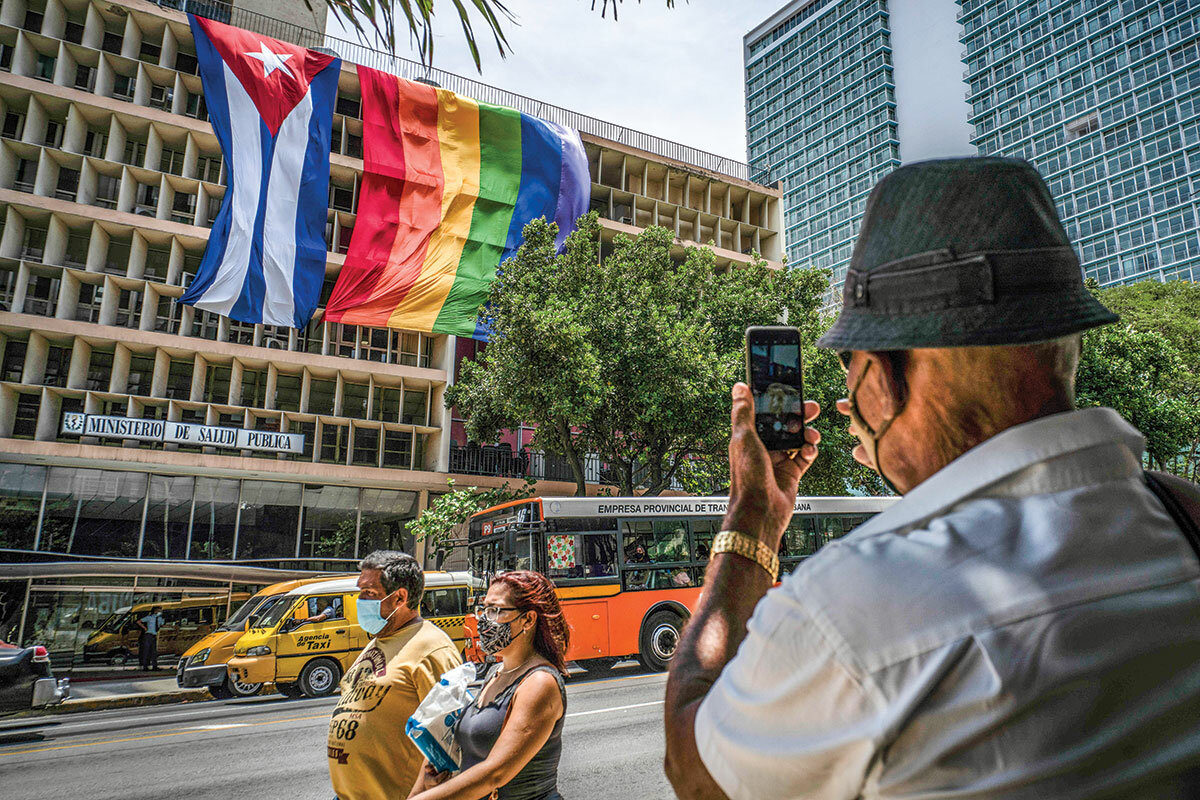Nature takes over: Kenyan wastewater, US toxic dump turned wetland
Loading...
Along with wins for the environment, the rights of marginalized people made gains in Latin America with the first celebration of LGBTQ history month by Cuba, and a court ruling affecting the U.S. southern border.
1. Mexico
Mexico’s Supreme Court banned random immigration checks for violating constitutional rights to equality and nondiscrimination. Immigration stops and checkpoints have grown increasingly common across Mexico due to pressure from the United States to prevent migrants from Central and South America from reaching the border. But they also allow immigration agents to single out individuals based on ethnicity, skin color, and language. That creates “disproportionate impacts on certain sectors of the population, especially Indigenous and Afro-Mexican people,” according to the court.
Why We Wrote This
In our progress roundup, time, effort, and ingenuity combine to show that people can undo what looks like irreversible environmental damage, and also improve how we use and protect natural resources every day.
The Supreme Court ruled in favor of an Indigenous family from southern Mexico who was wrongfully detained in 2015 while traveling by bus to work as farmhands in the north of the country. Immigration authorities will still be able to check the papers of migrants as they enter and leave the country and detain and deport migrants who are not legally permitted to remain in Mexico.
Sources: El País, Human Rights Watch
2. United States
A toxic Ohio junkyard was transformed into a thriving wetland in Cuyahoga Valley National Park. What used to be the Krejci dump closed in 1980 but remained chock-full of rusting cars, machinery, and other waste. In 1985, the National Park Service acquired the 47-acre tract of land, embarking on what would become the most extensive restoration and rehabilitation project in NPS history.
“Krejci was a ‘biological desert,’ meaning almost nothing could live in the area,” said Chris Davis, a plant ecologist for Cuyahoga Valley National Park. Today, the marshland boasts native grasses, wildflowers, and species like the Jefferson salamander, American toad, woodcock, and bald eagle. “To find this diversity of species there today is remarkable,” added Mr. Davis.
Six companies, including Ford and General Motors, collectively paid over $50 million to fund the cleanup after a Superfund lawsuit filed by the federal government held the corporations financially responsible. Trails, bridges, and facilities have yet to be built, but the site attracted close to 3 million visitors in 2021.
Source: National Geographic
3. Cuba
Cuba commemorated Latin America’s first LGBTQ history month. During May, the country joined over a dozen nations that dedicate a specific month to honor the LGBTQ community with celebrations, lectures, discussions, and workshops. Organizers created the campaign to promote inclusion and “help eliminate many years of discrimination,” said Raúl Pérez Monzón, a historian at the University of Havana.
In the 1960s, for instance, thousands of gay men were sent to “reeducation” labor camps; workplace and housing discrimination on the basis of sexual orientation or gender identity wasn’t outlawed until 2013. Despite continued opposition from the Roman Catholic Church, the country’s largest religious institution, activists say LGBTQ rights have come a long way in Cuba in recent years. “It’s an exciting time,” said Rodney Wilson, who organized the first LGBTQ History Month in the United States in 1994. “We are recognizing more globally the idea of shared and sustained history.”
Source: Thomson Reuters Foundation
4. Belgium
Fresh fruits and veggies now grow atop a Brussels supermarket. Since March, the new urban farm has yielded more than 2 tons of produce from over 60 types of plants. But beyond providing a healthy, local source of food, organizers say the project involves and supports nearby residents, especially those who are most vulnerable. “There is production, yes, but there is also training, and awareness, and cohesion of the social neighborhood,” said Francisco Dávila, a researcher at the agroecology lab of Vrije Universiteit.
With funding from the European Union, the pilot project is set to run two to three more years; if successful, the model could expand to other locations. The vegetative rooftop trend, shown to lower building energy use and improve air and water quality, has expanded around the world for decades. Germany passed laws encouraging green roofs in the 1980s, a model that gained ground in Canada and the U.S. in the early 2000s. In Copenhagen, Denmark, as well as Singapore, green roofs became mandatory on new buildings with relatively flat roofs in 2010. Some governments offer financial incentives for green roofs instead of requiring them.
Sources: Euronews, Global Times
5. Kenya
A Kenyan startup is filtering wastewater naturally and affordably. Omiflo’s system looks like a pond, with aquatic plants like cattails floating on the surface. These plants absorb oxygen from the air, which then feeds aerobic bacteria that break down contaminants. The model is in use at 200 sites around the world, including at the Giraffe Center in Nairobi, where it provides water for landscaping and flushing toilets. If treated with chlorine, the water can be fit to drink.
Only 40% of Nairobi’s population is connected to a sewage system, which is often too expensive for cities with limited resources to implement. While still small-scale, the hydroponic design illustrates the power of simplicity. “Plants have been used to treat water for thousands of years,” said Mshila Sio, founder of Omiflo, which was one of 16 winners of the No Waste Challenge hosted by What Design Can Do and the Ikea Foundation. “The installation cost is quite low and then operationally, you’re just looking after the plants. So, it’s very viable for low-income areas.”
Source: Positive News








